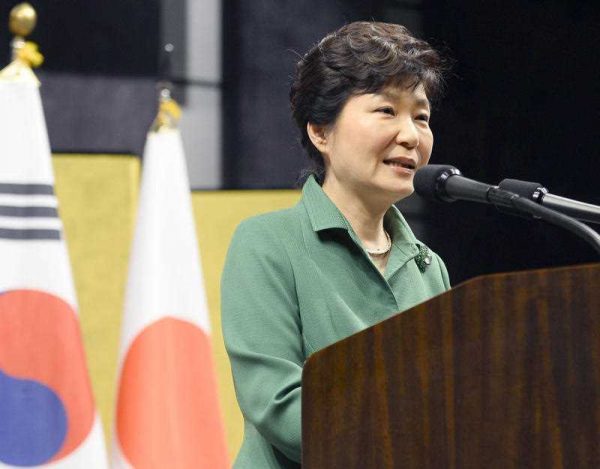After Park Geun-hye assumed office as president, South Korea not only re-ranked its foreign policy priorities from ‘the US, Japan, China’ to ‘the US, China, Japan’ but also pursued its own style of G2 diplomacy characterised by economic dependence on China. Park’s criticism of Japan’s historical perspective during her visits to Washington and Beijing also shocked Japan.
At the same time, Japanese Prime Minister Shinzo Abe supported the US rebalance to Asia and set out to reinforce the Japan–US alliance. Abe has also made several controversial decisions that have elevated tensions. Abe submitted a bill to the Diet that would allow Japan limited exercise of the right to collective self-defence. He reviewed the process by which the (the 1993 apology for the Japanese military’s wartime abuse of ‘comfort women’) had been prepared. And Abe will offer his own ‘70th Anniversary Statement’ of WWII in August 2015, but is unlikely to restate This was not all. The controversy over ‘comfort women’ had already escalated in 2011 under President Lee Myung-bak and Prime Minister Yoshihiko Noda. Inheriting this dispute, Park Geun-hye made a speech on the anniversary of the March 1st Movement — a movement for Korean independence from Japanese colonial rule in 1919 — shortly after becoming president, where she urged the Japanese government to ‘make positive changes and take responsible action’.
Altogether, differences over China policies and the ‘comfort women’ issue have not only become more clearly exposed during the Abe/Park era but they have also been coupled with a growing leadership clash. It hardly need be said that Abe’s responses to questions in the Diet that the definition of ‘invasion’ (shinryaku which has also been translated as ‘aggression’) has not been agreed upon by academics, as well as his visit to the controversial Yasukuni Shrine, intensified distrust on the South Korean side.
Growing mutual distrust at the leadership level has restrained the bureaucracy and encouraged greater nationalism in the media. Frictions between Japan and South Korea at the top of the pyramid have rapidly slipped down all the way to the popular base.
These tensions have been heightened primarily by disputes arising from historical memory, cultural traditions and nationalism — that is, a clash of identities — and not by structural friction or a clash of values. Systemic changes produced a leadership clash, which in turn made the identity clash more serious.
The most important task now is to ascertain the characteristics of the newly emerging international system — above all the development of US–China relations — and then rebuild Japan–ROK relations in conformity with this system. There is no going back. Japan and South Korea should instead reaffirm their common interests and make a new start.
Japan and South Korea share many key elements in common. Geopolitically, they both sit in a valley between the US and China. They share a common interest in maintaining solid alliance relations with the United States and, over the long term, encouraging the emergence of China as a responsible major power. Strategic dialogue between Japan and South Korea on this issue is essential.
As highly developed industrial and trading nations, both Japan and South Korea support broad-based economic integration. A sophisticated international division of labour — which includes sharing manufacturing processes for high-tech goods — is already developing, especially in the parts and materials industries. The joint development of resources and infrastructure construction in developing countries are also expanding.
Due to the small steps forward made ahead of the 50th anniversary of the Japan–ROK Treaty on Basic Relations, it appears that a Japan–China–South Korea summit meeting will be held in Seoul later in 2015. A Japan–ROK summit meeting will likely also be arranged. But for this meeting to be truly successful, both Abe and Park must be determined to resolve key issues such as that of the ‘comfort women’. Any improvement to Japan-ROK relations will only be partial until such a resolution is reached.
Masao Okonogi is Professor Emeritus of Keio University. He was Dean of the Faculty of Law and Politics (2005–07) and Director of the Center for Area Studies (1995–99) at Keio University.
A version of this article first appeared here on AJISS-Commentary.


Abe did note the pain and suffering inflicted on women during the war in his recent 70 Th anniversary speech. But he made no mention of the ‘comfort women’ at all, let lone of the need to reconcile with them and thus the ROK. This leaves me doubting that there is much of an opening for things to improve between the two countries…..unless the USA is willing to take a much more active role in brokering some kind of deal. Would Kerry be willing to do a Kissinger type of diplomatic shuttling back and forth in order to ease a path towards serious dialogue between Park and Abe?